Student's Guide to Writing College Papers

On Writing, Editing, and Publishing
JACQUES BARZUN
Telling About Society
HOWARD S. BECKER
Tricks of the Trade
HOWARD S. BECKER
Writing for Social Scientists
HOWARD S. BECKER
Permissions, A Survival Guide
SUSAN M. BIELSTEIN
The Craft of Translation
JOHN BIGUENET AND RAINER SCHULTE, EDITORS
The Craft of Research
WAYNE C. BOOTH, GREGORY G. COLOMB, AND JOSEPH M. WILLIAMS
The Dramatic Writer's Companion
WILL DUNNE
Glossary of Typesetting Terms
RICHARD ECKERSLEY, RICHARD ANGSTADT, CHARLES M. ELLERSTON, RICHARD HENDEL, NAOMI B. PASCAL, AND ANITA WALKER SCOTT
Writing Ethnographic Fieldnotes
ROBERT M. EMERSON, RACHEL I. FRETZ, AND LINDA L. SHAW
Legal Writing in Plain English
BRYAN A. GARNER
From Dissertation to Book
WILLIAM GERMANO
Getting It Published
WILLIAM GERMANO
A Poet's Guide to Poetry
MARY KINZIE
The Chicago Guide to Collaborative Ethnography
LUKE ERIC LASSITER
How to Write a BA Thesis
CHARLES LIPSON
Cite Right
CHARLES LIPSON
The Chicago Guide to Writing about Multivariate Analysis
JANE E. MILLER
The Chicago Guide to Writing about Numbers
JANE E. MILLER
Mapping It Out
MARK MONMONIER
The Chicago Guide to Communicating Science
SCOTT L. MONTGOMERY
Indexing Books
NANCY C. MULVANY
Developmental Editing
SCOTT NORTON
Getting into Print
WALTER W. POWELL
The Subversive Copy Editor
CAROL FISHER SALLER
A Manual for Writers of Research Papers, Theses, and Dissertations
KATE L. TURABIAN
Tales of the Field
JOHN VAN MAANEN
Style
JOSEPH M. WILLIAMS
A Handbook of Biological Illustration
FRANCES W. ZWEIFEL
GREGORY G. COLOMB is professor of English at the University of Virginia. He is the author of Designs on Truth: The Poetics of the Augustan Mock-Epic.
JOSEPH M. WILLIAMS was professor emeritus in the Department of English Language and Literature at the University of Chicago. Professor Williams died in 2008.
Together Colomb and Williams have written The Craft of Research, currently in its third edition (University of Chicago Press, 2008). They also revised the seventh edition of Kate L. Turabian's A Manual for Writers of Research Papers, Theses, and Dissertations (University of Chicago Press, 2007).
The University of Chicago Press, Chicago 60637
The University of Chicago Press, Ltd., London
2010 by The University of Chicago
All rights reserved. Published 2010
Printed in the United States of America
19 18 17 16 15 14 13 12 11 10 1 2 3 4 5
ISBN-13: 978-0-226-81630-2 (cloth)
ISBN-10: 0-226-81630-3 (cloth)
ISBN-13: 978-0-226-81631-9 (paper)
ISBN-10: 0-226-81631-1 (paper)
Library of Congress Cataloging-in-Publication Data
Turabian, Kate L.
Student's guide to writing college papers / Kate L. Turabian.4th ed. / rev. by Gregory G. Colomb, Joseph M. Williams, and the University of Chicago Press editorial staff.
p. cm.(Chicago guides to writing, editing, and publishing)
Includes bibliographical references and index.
ISBN-13: 978-0-226-81630-2 (cloth: alk. paper)
ISBN-10: 0-226-81630-3 (cloth: alk. paper)
ISBN-13: 978-0-226-81631-9 (pbk.: alk. paper)
ISBN-10: 0-226-81631-1 (pbk.: alk. paper) 1. Dissertations, Academic
Handbooks, manuals, etc. 2. Academic writingHandbooks, manuals, etc.
I. Colomb, Gregory G. II. Williams, Joseph M. III. Title.
LB2369.T8 2010
808'.02dc22 2009031583
 The paper used in this publication meets the minimum requirements of the American National Standard for Information SciencesPermanence of Paper for Printed Library Materials, ANSI Z39.48-1992.
The paper used in this publication meets the minimum requirements of the American National Standard for Information SciencesPermanence of Paper for Printed Library Materials, ANSI Z39.48-1992.
Contents
Preface for Teachers
This book was written in the belief that research matters and that your students can, and should, do it.
We have what we think are good reasons for those beliefs. Research matters because
it is ubiquitous in the workplaces of our information age, especially among those who do not think of themselves as researchers;
the experience of doing research is the best preparation for a world in which we constantly depend on the claims of experts;
the questioning mind-set of a researcher fosters the kind of critical thinking that students need now more than ever;
the ability to do research can free us from the tyranny of false authorities, including our own prejudices.
We believe students can do research because
the core activities of researchfinding information to solve a problemare a part of everyone's daily life;
the core elements of a research argumentgiving good reasons and evidence to convince someone to act or think differentlyare also a part of everyone's daily life;
the two of us have taught thousands of students to do it, starting as early as the eighth grade.
Why then do so few students actually do it well? Because, we think, the research they do in school is framed in a way that cuts off, rather than enables, students' intuitions about how one uses information to solve a problem or to convince others to change what they do or think; also because schools have not, for the most part, helped students understand why the distinctive forms of research and argument we expect in school are rational applications of what they already know how to do.
This book repurposes the ideas, principles, and practical wisdom in two earlier guides we wrote for advanced students and practicing researchersThe Craft of Research (3rd ed., 2008) and the Turabian guide to theses and dissertations (A Manual for Writers of Research Papers, Theses, and Dissertations, 7th ed., 2007). We describe what we've done with that odd, new-media verb repurpose because we have not approached this beginners' text in the usual way: We have done more than simply translate our advice from researcher-speak to student-speak, though we have done that. We have done more than eliminate what is beyond the experience or resources of beginners, though wehave done some of that too. But, most of all, we have refused to redefine the task of research, distorting it in the interests of simplifying it.
Too many students have arrived in our classes with falseand damagingideas of research: that its core activity is collecting information; that the writing that researchers do is pure report and the writer pure conduit; that in the workplace researchers are those who look up information for other, more important people to use; that in the academy, the only reason to do research is some quirky interest in a subject no one else cares about. These views, predominant among the students we see, handicap them not just for writing what their college teachers ask of them, but for their entire career as learners, citizens, and workers.
Research is above all about having a purpose, about solving problems. Its most important activities happen before and after collecting information. And it depends far more on thinking than on doggedness in the library or lab, or over a keyboard, though it does also depend on that. Although this book will help students write papers more pleasing to their teachers, its chief design is to lead students to develop a truer, more useful, and more attractive under-standing of research.

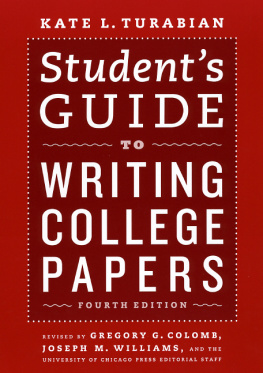
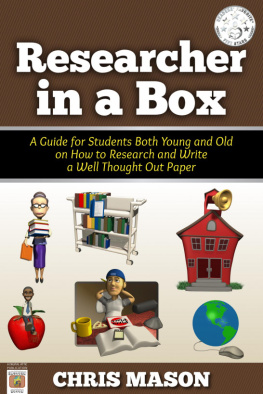

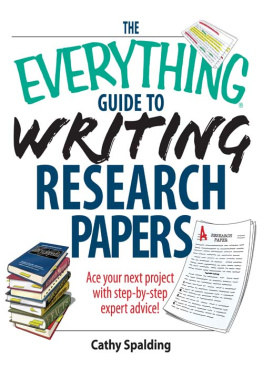
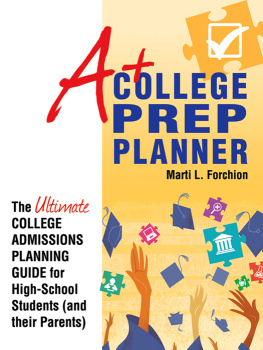
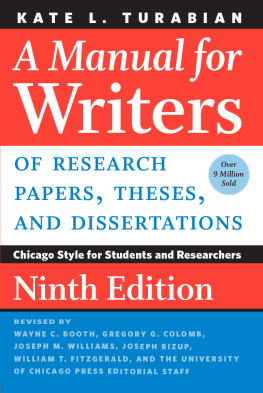
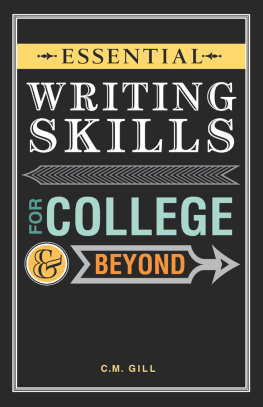
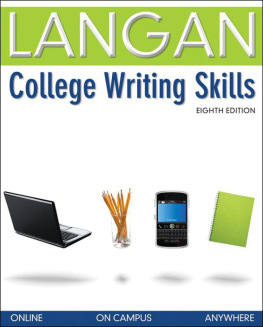
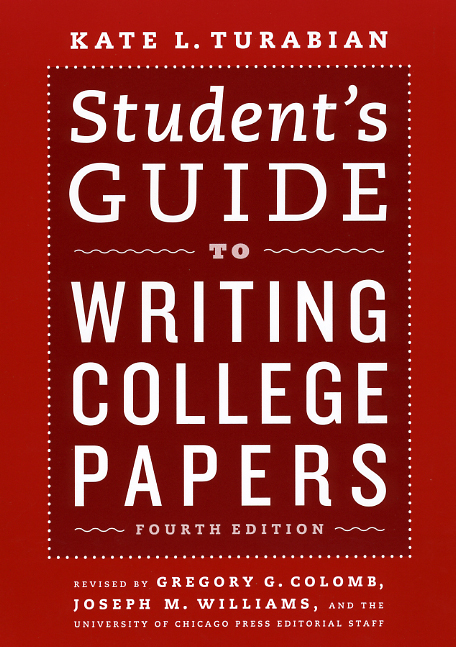

 The paper used in this publication meets the minimum requirements of the American National Standard for Information SciencesPermanence of Paper for Printed Library Materials, ANSI Z39.48-1992.
The paper used in this publication meets the minimum requirements of the American National Standard for Information SciencesPermanence of Paper for Printed Library Materials, ANSI Z39.48-1992.